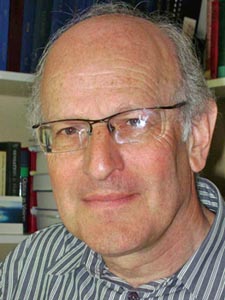8. Happiness, Health and Evolution
Previous - Next - Contents
A recent article in the weekly International Magazine The
Economist ("The U-bend of Life" - December 18, 2010, page 33) reports that
happiness doesn't just make people happy - it also makes them
healthier and more productive. Here follow their stated details.

- John Weinman, professor of psychiatry at King's College London,
monitored the stress levels of a group of volunteers and then inflicted small
wounds on them.
The wounds of the least stressed healed twice as
fast as those of the most stressed.
- Sheldon Cohen at the Carnegy Mellon University in Pittsburg,
infected people with cold and flu viruses.
He found that happier
types were less likely to catch the virus, and showed fewer symptons of
illness when they did.
- Andrew Oswald, Eugenio Proto and Daniel Sgroi of the University
of Warwick UK, cheered up a bunch of volunteers by showing them a funny film, then
set them mental tests and compared their performance to groups that had seen
a neutral film, or no film at all. The ones who had seen the funny
film performed 12% better.
The Norwegian biologist Bjørn Grinde, in his book Darwinian
Happiness, takes the importance of Happinss even a step further. Here
is part of a synopsis of his book from the Wikipedia :
 Bjørn Grinde argues that human emotions find their cause in
evolution and offers ways by which we can use this for our advantage.
Bjørn Grinde argues that human emotions find their cause in
evolution and offers ways by which we can use this for our advantage.
More specifically, mammals are equipped with a nerve system that enables them
to distinguish not only between pleasant and unpleasant sensations, but positive and
negative experiences in general.
While the biological term fitness refers to the capacity to create offspring,
happiness (or quality of life) is, at least in a biological perspective, a
question of the qualities of the experiences our nervous system offers us.
In order to improve these experiences there are two main principles to
consider: -
To utilize the rewarding sensations the brain is designed to offer in a way that
gives optimal long-term benefits; and, similarly, to avoid punishing
sensations.
-
To avoid stress and maladaptive ways of living in order to have a healthy mind with
optimal potential for positive experiences.
Humans may actually have been equipped with more powerful positive and
negative sensations, compared to other mammals, due to our capacity for free will.
That is, evolution might tend to add stronger incentives for behavior
benefiting the genes in an individual with a powerful free will; as
otherwise, the free will could easily result in maladaptive behavior.
I find this a very exiting idea, as it strongly suggest that the pursuit of
Happiness (as well as all other qualities we consider as good, positive or
beautiful) actually helps to steer the evolution of our human species as a
whole onto a progressive, positive course.
Therefore the pursuit of happiness produces benefits at three levels :
- For yourself,
- for those in contact with you around you,
- and for the human species as a whole.
|
Next Page -
Top of Page
Copyright © 2010-2011 Michael Furstner
|

